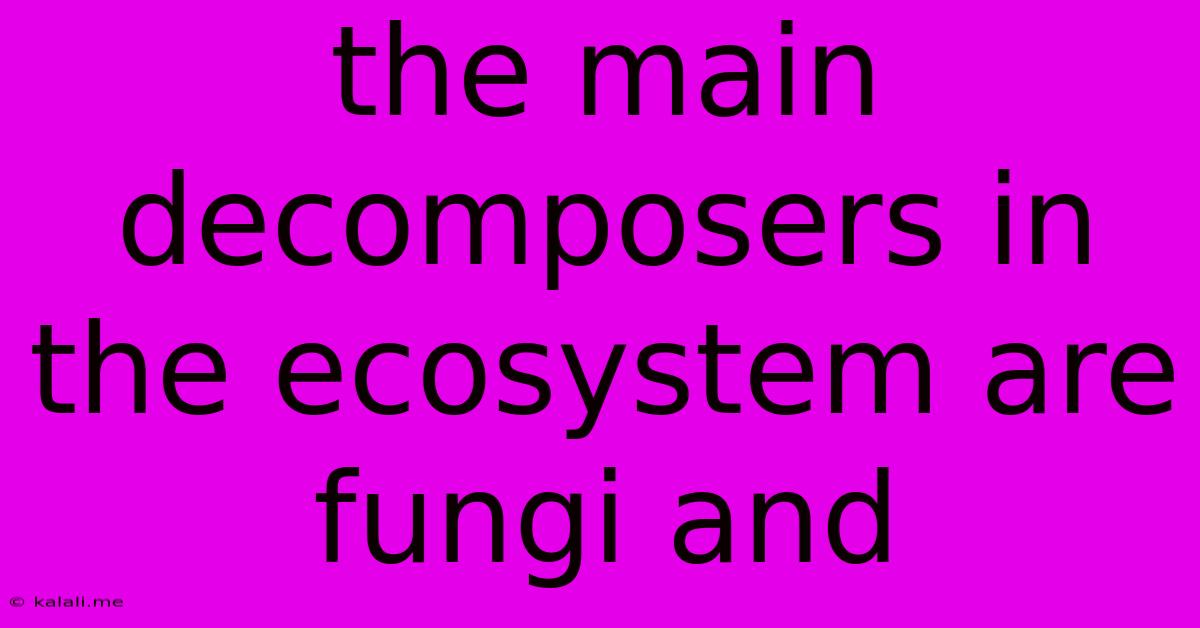The Main Decomposers In The Ecosystem Are Fungi And
Kalali
Jun 12, 2025 · 3 min read

Table of Contents
The Main Decomposers in the Ecosystem: Fungi and Bacteria – Nature's Recycling Team
Meta Description: Discover the crucial roles of fungi and bacteria as the primary decomposers in ecosystems, breaking down organic matter and recycling nutrients. Learn about their unique methods and the importance of their symbiotic relationships.
The world's ecosystems wouldn't function without the tireless work of decomposers. These unsung heroes silently break down dead plants and animals, recycling essential nutrients back into the environment. While numerous organisms contribute to decomposition, fungi and bacteria are the primary decomposers, playing a critical role in maintaining the balance of life. Their actions are fundamental to nutrient cycling, soil formation, and the overall health of our planet.
Fungi: The Masters of Decay
Fungi, a kingdom of eukaryotic organisms distinct from plants and animals, are incredibly efficient decomposers. Their success stems from several key adaptations:
-
Extensive Hyphae Networks: Fungi possess a vast network of thread-like structures called hyphae. This intricate network allows them to penetrate and spread throughout decaying organic matter, maximizing their surface area for nutrient absorption. Think of it as a microscopic plumbing system efficiently extracting resources.
-
Enzyme Secretion: Fungi secrete a wide array of powerful enzymes, including cellulases, ligninases, and chitinases. These enzymes break down complex organic molecules like cellulose (the main component of plant cell walls), lignin (a complex polymer in woody tissues), and chitin (found in insect exoskeletons) into simpler compounds. This process releases nutrients locked within these structures, making them available to other organisms.
-
Diverse Species: The fungal kingdom boasts incredible diversity, with species specialized in breaking down various substrates. Some fungi excel at decomposing wood, others specialize in leaf litter, and still others target animal remains. This specialization ensures efficient decomposition across a wide range of organic materials.
Bacteria: The Microbial Workhorses
Bacteria, single-celled prokaryotic organisms, are equally vital decomposers. While often overshadowed by fungi in macroscopic decomposition, bacteria's contribution is immense:
-
Ubiquity and Metabolic Diversity: Bacteria are found virtually everywhere, from soil and water to the air and within other organisms. They exhibit remarkable metabolic diversity, enabling them to break down a broad range of organic compounds, including those that fungi struggle to process.
-
Rapid Reproduction: Bacteria reproduce rapidly, allowing them to quickly colonize decaying organic matter and accelerate the decomposition process. Their fast turnover contributes significantly to the speed at which nutrients are recycled.
-
Synergistic Relationships: Bacteria often work in synergy with fungi. Fungi, through their enzymatic activity, often break down complex materials into simpler compounds that bacteria can then utilize, creating a highly efficient decomposition pathway. This collaborative effort demonstrates the interconnectedness of life within an ecosystem.
The Importance of Decomposer Synergy
The interaction between fungi and bacteria is a powerful example of synergistic decomposition. Fungi often initiate the breakdown of complex organic matter, creating pathways for bacteria to access and further process the resulting simpler compounds. This cooperative process is essential for the efficient recycling of nutrients within the ecosystem. The breakdown of organic matter by both fungi and bacteria releases crucial nutrients like nitrogen, phosphorus, and potassium back into the soil, making them available for plant uptake. This cycle is fundamental to plant growth and overall ecosystem productivity. Without these decomposers, nutrients would remain locked within dead organic matter, limiting the growth and survival of plants and other organisms.
In conclusion, fungi and bacteria are the primary drivers of decomposition, forming a vital link in the continuous cycle of life. Their combined efforts ensure the recycling of essential nutrients, maintaining the health and productivity of ecosystems worldwide. Their importance is often overlooked, but their contribution is fundamental to the planet's biodiversity and survival.
Latest Posts
Latest Posts
-
Higher Level Languages Vs Assembly Language Pros And Cons
Jun 13, 2025
-
What Are The Multiples Of 17
Jun 13, 2025
-
Processor Speed Cpu Is Measured In
Jun 13, 2025
-
Which One Of The Following Is The Largest Industries Today
Jun 13, 2025
-
A Carbohydrate Found In Bread And Pasta
Jun 13, 2025
Related Post
Thank you for visiting our website which covers about The Main Decomposers In The Ecosystem Are Fungi And . We hope the information provided has been useful to you. Feel free to contact us if you have any questions or need further assistance. See you next time and don't miss to bookmark.